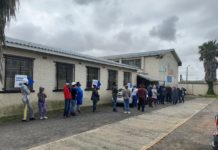For many of South Africa’s urban poor, poverty is a trap they cannot escape. Their poverty means they often pay higher prices for goods and services, and a disproportionate amount of their income is spent on accommodation and transport. The biggest cost is not just financial – they’re also “time poor” between working long hours and travelling hours to and from work. *MINENHLE MAJOZI told Mbali Zwane the price she pays to live in the City of Gold.
I moved to Joburg from Kwazulu Natal to look for a job that would help me take care of my two children. I left them with their grandmother and even though I’ve been here for more than 10 years, I still don’t earn enough or have room and time to have them come to live with me.
I work a 5am to 5pm or 5am to 1pm or shift six days a week in a kitchen at a takeaway shop at the taxi rank. I earn R550 weekly, depending on the hours I work. On average I work between 55 and 63 hours a week. Being a non-unionised worker is a real disadvantage because I’ve been working here for years but my wage hasn’t increased that much and I never take sick leave because I’m not sure how that works.  If I get sick and cannot come to work, I don’t get that day’s pay. If I’m sick and need to go to the clinic I have to wait until it is my day off.
*Editors’ note: All employees are entitled to paid sick leave in terms of the Basic Conditions of Employment Act.
The owner of the shop where I work is a well-respected businessman in Soweto. He’s a black person like me so you’d assume he would understand that family traditions and celebrations are important but no, I’ve missed important family stuff like funerals and cleansing ceremonies because I couldn’t take time off.
I’m on my feet for 11 hours straight on most days, then I have to walk for half an hour to the converted garage that I’m renting for R800 per month. I leave for work by 4:30 am and it’s not safe; I got stabbed one morning by two thugs who took my bag and phone. I was up the next day and walking on the same path. I now carry scissors and a knife for protection and try to change my route to work.
I converted the garage into a bedroom and kitchen and I share the outside toilet and tap with about four more families in the yard. On days when I’m not working, I have to do a week’s cleaning and laundry or go to the clinic. When I go to the clinic, I must leave the house by 5am to avoid the long queue. It doesn’t make a difference because I still sit in that clinic for hours, watching the nurses parading to teatime in front of patients before assisting us. This is one of the reasons I got misdiagnosed a couple of months ago. Then they realised they made a mistake and I had to be moved forward to get treatment.
I moved closer to work because I was spending R400 on transport. I can now add that to the money I send home to my children. I wake up early through the year but rarely enjoy the money I work so hard for. I’m with my children for about three weeks a year, between their school holidays and my annual leave. I talk to them over the phone weekly and remind them that I love them and I’m doing this for them. I cannot wait for them to finish school and start working.
*Name has been changed.
The Daily Vox, in partnership with Oxfam South Africa, will be highlighting the challenges of socio-economic inequality in a special project this month.

![Kliptown 5 [slider]](https://www.thedailyvox.co.za/wp-content/uploads/2016/01/Kliptown-5-1-e1453887185105.jpg)







